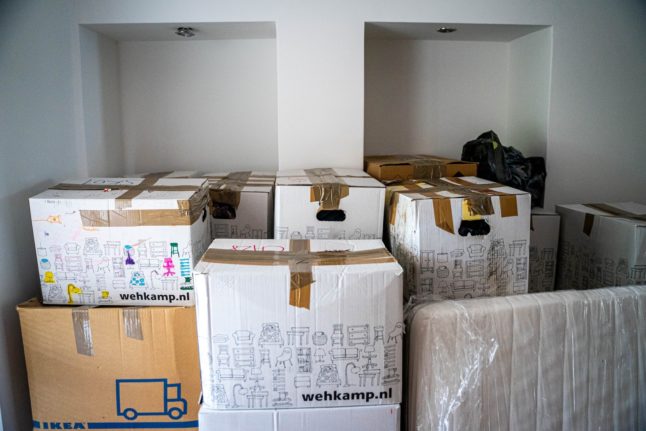EXPLAINED: Do you have to pay duty if you bring furniture from the UK to Italy?

Brexit has ushered in a host of extra rules and restrictions on imports to Italy from the UK, but what is the rule for people bringing household items?
Moving house within the EU is pretty simple – load up a van with stuff and cross the border. But since the UK left the EU, bringing any goods from the UK to Italy has become a lot more complicated.
So what’s the deal if either you want to move and bring all your possessions over, or you just want to shift some furniture or household items to a second home in Italy?
Well, there are quite a few things to consider.
Banned items
Firstly certain items are banned altogether. These are mostly explosives and certain types of weapon, which hopefully won’t feature in many people’s removal vans.
Restricted items
Then there are certain items that cannot be imported without extra paperwork such as veterinary certificates.
This includes a lot of different food products so if you’re planning on emptying your kitchen cupboards to bring, check very carefully that none of the foodstuffs are on the restricted list. It also covers flowers and plants, if you were planning on bringing garden supplies.
Alcohol and tobacco
There are limits on the amount of alcohol and tobacco you can bring in to Italy from a non-EU country – check HERE.
Cash
If you’re carrying more than €10,000 in cash you need to declare this to customs officers when you cross the border.
Pets
The EU Pet Passport no longer covers any trips from the UK for dogs, cats or ferrets – find out the new protocol HERE.
Unlike many other EU countries, Italy doesn't ban specific dog breeds from entering the country, but the city of Venice prohibits Rottweilers and Doberman Pinschers.
Household goods
As well as limits on certain types of items there is also a rule on the overall value of the items you are bringing with you – specifically you need to declare and pay duty on items whose total value is more than €150.
Following a change that came into force in July 2021, a customs declaration form is required for all goods imported from outside the EU, and Italian VAT must be paid on items with any monetary value (unless the package is sent between private individuals and the value of its contents is below €45).

What are the rules on transporting furniture and other household goods to Italy? Photo by Michal Balog on Unsplash
However, there is an exception for people relocating to Italy.
The Italian customs agency says: "Personal property of individuals that are moving their normal residence to Italy from UK is generally entitled to VAT and customs duty relief" if you are bringing household goods which you have owned for more than six months.
To qualify, you also need to be able to show that you have been living in a non-EU country for at least the preceding 12 months.
READ ALSO: Visas and residency permits: How to move to Italy (and stay here)
The exemption only applies if you have Italian residency: you’ll need to show the customs office both your permesso di soggiorno stay permit, obtained from the questura police headquarters, and your residency certificate, issued by the comune town hall where you’re resident.
Note that buying a second home does not automatically entitle you to a stay permit or give you any residency rights; non-EU nationals require a visa in order to stay in Italy for more than 90 days in a 180-day period.
To claim the import duty relief, you’ll need to file a request with your local customs office once your household goods have arrived in Italy.
You’ll also need to be able to show the customs office your passport and your Italian tax code.
According to the A1 Auto Transport international moving company, you’ll need to prepare a significant amount of paperwork, including filling out a customs declaration form and making a detailed inventory of all items that is signed and stamped by the Italian consulate of your departure country.
While the Italian customs website does not provide any details on timelines, A1 says you should transport your items within six months of moving to Italy in order to be eligible for import duty relief.
READ ALSO: Everything you need to know about having a second home in Italy
If you’re using a shipping company, they should be familiar with the process and able to advise you on the documentation required and the most up-to-date procedures.
If you don’t qualify for import tax relief, you’ll be liable to pay both customs duty and VAT. The Italian customs agency website says that customs duty varies according to the type of good being transported, while VAT is 20 percent.
Online calculators like those provided by Simply Duty or Easyship can help you determine how much import tax you’ll have to pay.
Please note that the Local is unable to advise on specific cases. For more information, refer to the Italian customs agency website or contact the customs office of your town of residency.
Comments
See Also
Moving house within the EU is pretty simple – load up a van with stuff and cross the border. But since the UK left the EU, bringing any goods from the UK to Italy has become a lot more complicated.
So what’s the deal if either you want to move and bring all your possessions over, or you just want to shift some furniture or household items to a second home in Italy?
Well, there are quite a few things to consider.
Banned items
Firstly certain items are banned altogether. These are mostly explosives and certain types of weapon, which hopefully won’t feature in many people’s removal vans.
Restricted items
Then there are certain items that cannot be imported without extra paperwork such as veterinary certificates.
This includes a lot of different food products so if you’re planning on emptying your kitchen cupboards to bring, check very carefully that none of the foodstuffs are on the restricted list. It also covers flowers and plants, if you were planning on bringing garden supplies.
Alcohol and tobacco
There are limits on the amount of alcohol and tobacco you can bring in to Italy from a non-EU country – check HERE.
Cash
If you’re carrying more than €10,000 in cash you need to declare this to customs officers when you cross the border.
Pets
The EU Pet Passport no longer covers any trips from the UK for dogs, cats or ferrets – find out the new protocol HERE.
Unlike many other EU countries, Italy doesn't ban specific dog breeds from entering the country, but the city of Venice prohibits Rottweilers and Doberman Pinschers.
Household goods
As well as limits on certain types of items there is also a rule on the overall value of the items you are bringing with you – specifically you need to declare and pay duty on items whose total value is more than €150.
Following a change that came into force in July 2021, a customs declaration form is required for all goods imported from outside the EU, and Italian VAT must be paid on items with any monetary value (unless the package is sent between private individuals and the value of its contents is below €45).

However, there is an exception for people relocating to Italy.
The Italian customs agency says: "Personal property of individuals that are moving their normal residence to Italy from UK is generally entitled to VAT and customs duty relief" if you are bringing household goods which you have owned for more than six months.
To qualify, you also need to be able to show that you have been living in a non-EU country for at least the preceding 12 months.
READ ALSO: Visas and residency permits: How to move to Italy (and stay here)
The exemption only applies if you have Italian residency: you’ll need to show the customs office both your permesso di soggiorno stay permit, obtained from the questura police headquarters, and your residency certificate, issued by the comune town hall where you’re resident.
Note that buying a second home does not automatically entitle you to a stay permit or give you any residency rights; non-EU nationals require a visa in order to stay in Italy for more than 90 days in a 180-day period.
To claim the import duty relief, you’ll need to file a request with your local customs office once your household goods have arrived in Italy.
You’ll also need to be able to show the customs office your passport and your Italian tax code.
According to the A1 Auto Transport international moving company, you’ll need to prepare a significant amount of paperwork, including filling out a customs declaration form and making a detailed inventory of all items that is signed and stamped by the Italian consulate of your departure country.
While the Italian customs website does not provide any details on timelines, A1 says you should transport your items within six months of moving to Italy in order to be eligible for import duty relief.
READ ALSO: Everything you need to know about having a second home in Italy
If you’re using a shipping company, they should be familiar with the process and able to advise you on the documentation required and the most up-to-date procedures.
If you don’t qualify for import tax relief, you’ll be liable to pay both customs duty and VAT. The Italian customs agency website says that customs duty varies according to the type of good being transported, while VAT is 20 percent.
Online calculators like those provided by Simply Duty or Easyship can help you determine how much import tax you’ll have to pay.
Please note that the Local is unable to advise on specific cases. For more information, refer to the Italian customs agency website or contact the customs office of your town of residency.
Join the conversation in our comments section below. Share your own views and experience and if you have a question or suggestion for our journalists then email us at [email protected].
Please keep comments civil, constructive and on topic – and make sure to read our terms of use before getting involved.
Please log in here to leave a comment.